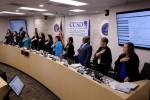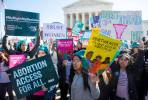To ensure ‘loyalty to the state’
Research conducted by the National Home Education Research Institute in 2001 shows home-schooled students, on average, outperformed their public school peers by 30 to 37 percentile points across all subjects, and that performance gaps impacting minorities and genders are virtually eliminated among the home-schoolers.
For those who worry the home-schoolers may have faked the tests, there are other measures.
On May 22, 2003, eighth-grader James Williams of Vancouver, Washington, became the second home-schooler in a row to win the National Geography Bee, taking home a $25,000 scholarship.
Although home-schoolers make up approximately 2 percent of the U.S. school-age population, they made up 12 percent of the 251 spelling bee finalists and 5 percent of the 55 geography bee finalists. The Cato institute actually reports the number of home-schooled winners of the National Spelling Bee (which includes Canadians) runs neck-and-neck with the number of winners who attend U.S. public schools -- despite the public-school kids outnumbering the home-schoolers 49-to-1.
This can be deeply embarrassing to supporters of the notion that only "certified" teachers with years of ticket-punching behind them in the ed schools can possibly master the difficult task of educating kids.
So it's hardly surprising that Lloyd Porter, a member of the board of directors of the California Teachers Association, told the San Francisco Chronicle "We're happy" at news that California's Second District Court of Appeal last week declared the parents of most of the state's 166,000 home-schooled children to be outlaws, ruling California law requires parents to send their children to full-time public or private schools or else have them taught at home by "credentialed" tutors -- which most home-school parents, presumably, aren't.
"We always think students should be taught by credentialed teachers, no matter what the setting," Mr. Porter preened.
"California courts have held that ... parents do not have a constitutional right to home school their children," Judge H. Walter Croskey said in the 3-0 ruling issued on Feb. 28.
And those parents can be criminally prosecuted for failing to comply.
"A primary purpose of the educational system is to train school children in good citizenship, patriotism and loyalty to the state and the nation as a means of protecting the public welfare," the judge wrote, quoting from a 1961 case on a similar issue.
Imagine that. Not the Three R's, but "loyalty to the state."
Michael Smith, president of the Home School Legal Defense Association, said the ruling would effectively ban home schooling in the state: "California is now on the path to being the only state to deny the vast majority of home-schooling parents their fundamental right to teach their own children at home," he said.
The ruling arose from a child welfare dispute between the Los Angeles County Department of Children and Family Services and Philip and Mary Long of Lynwood, who have been home schooling their eight children. Mary Long is their teacher, but holds no teaching state "credential."
As dissatisfaction with the public schools grows -- based on violence and concerns that children are being propagandized on non-academic topics as well as crumbling scholarly performance -- it was inevitable that someone would try to dam the trickle of home-schooled escapees before it becomes a river. And it's hardly surprising that the first blow would fall in nanny-state California.
Although in Pierce v. Society of Sisters in 1925 the U.S. Supreme Court struck down an Oregon law that would have prohibited parents from satisfying a state compulsory attendance requirement by sending their children to private school, no such definitive defense of a right to home school has yet been handed down.
But that's not to say the California ruling is in the mainstream.
The Pierce decision further asserts: "The fundamental theory of liberty upon which all governments in this Union repose excluded any general power of the state to standardize its children by forcing them to accept instruction from public teachers only. The child is not the mere creature of the state. ..."
In Prince v. Massachusetts in 1944, the Supreme Court held: "It is cardinal with us that the custody, care, and nurture of the child reside first in the parents, whose primary function and freedom include preparation for obligations the State can neither supply nor hinder."
And as recently as 1972, in Wisconsin v. Yoder, the court ruled Amish parents can pull their kids out of the public schools after the eighth grade in order to school and apprentice them in useful trades at home, Chief Justice Warren Burger writing:
"This case involves the fundamental interest of parents, as contrasted with that of the state, to guide the religious future and education of their children. The history and culture of Western civilization reflect a strong tradition of parental concern for the nurture and upbringing of their children. This primary role of the parents in the upbringing of their children is now established beyond debate as an enduring tradition."
Everywhere, it now appears, but in California.























